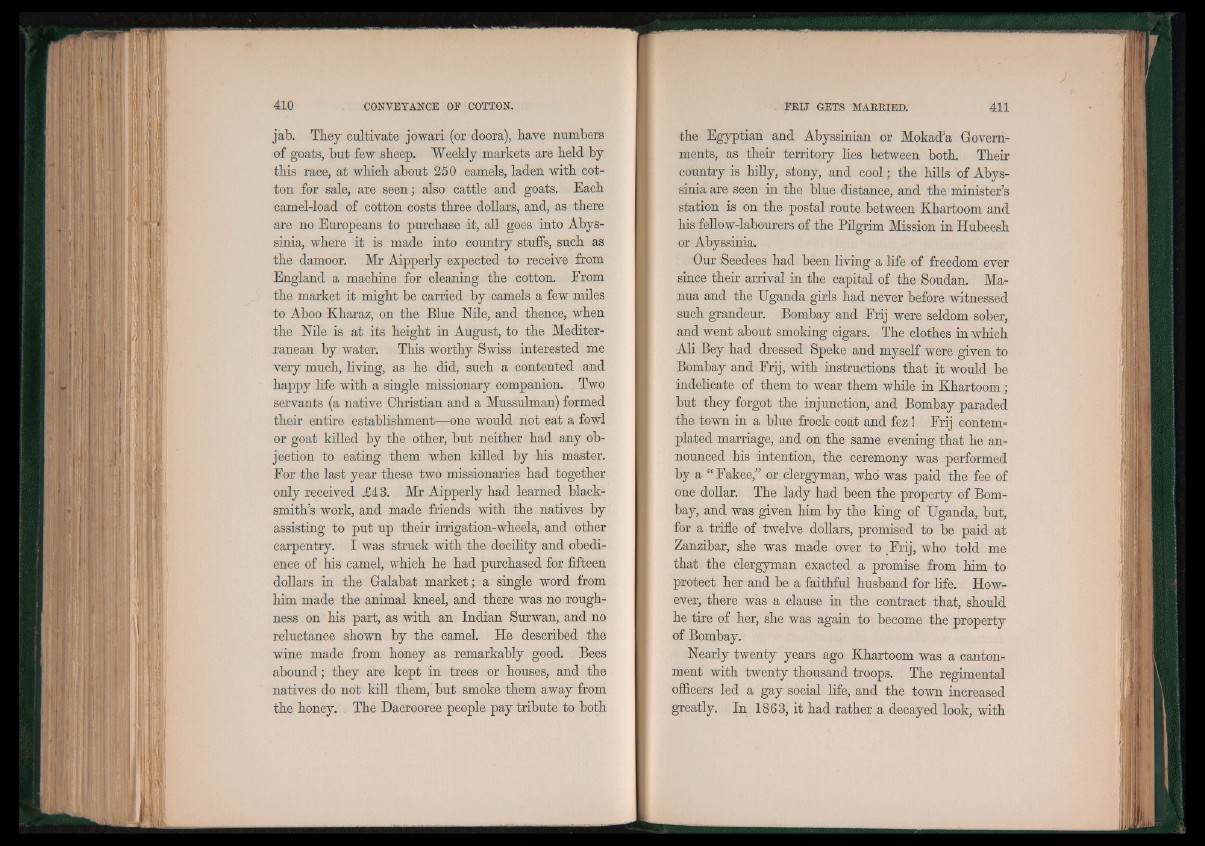
jab. They cultivate jowari (or doora), have numbers
of goats, but few sheep. Weekly markets are held by
this race, at which about 250 camels, laden with cotton
for sale, are seen; also cattle and goats. Each
camel-load of cotton costs three dollars, and, as there
are no Europeans to purchase it, all goes into Abyssinia,
where it is made into country stuffs, such as
the damoor. Mr Aipperly expected to receive from
England a machine for cleaning the cotton. From
the market it might be carried by camels a few miles
to Aboo Kharaz, on the Blue Nile, and thence, when
the Nile is at its height in August, to the Mediterranean
by water. This worthy Swiss interested me
very much, living, as he did, such a contented and
happy life with a single missionary companion. Two
servants (a native Christian and a Mussulman) formed
their entire establishment—one would not eat a fowl
or goat killed by the other, but neither had any objection
to eating them when killed by his master.
For the last year these two missionaries had together
only received £43. Mr Aipperly had learned blacksmith’s
work, and made friends with the natives by
assisting to put up their irrigation-wheels, and other
carpentry. I was struck with the docility and obedience
of his camel, which he had purchased for fifteen
dollars in the Galabat market; a single word from
him made the animal kneel, and there was no roughness
on his part, as with an Indian Surwan, and no
reluctance shown by the camel. He described the
wine made from honey as remarkably good. Bees
abound; they are kept in trees or houses, and the
natives do not kill them, but smoke them away from
the honey. The Dacrooree people pay tribute to both
the Egyptian and Abyssinian or Mokad’a Governments,
as their territory lies between both. Their
country is hilly, stony, and cool ; the hills of Abyssinia
are seen in the blue distance, and the minister’s
station is on the postal route between Khartoom and
his fellow-labourers of the Pilgrim Mission in Hubeesh
or Abyssinia.
Our Seedees had been living a life of freedom ever
since their arrival in the capital of the Soudan. Ma-
nua and the Uganda girls had never before witnessed
such grandeur. Bombay and Frij were seldom sober,
and went about smoking cigars. The clothes in which
Ali Bey had dressed Speke and myself were given to
Bombay and Frij, with instructions that it would be
indelicate of them to wear them while in Khartoom ;
but they forgot the injunction, and Bombay paraded
the town in a blue frock-coat and fez ! Frij contemplated
marriage, and on the same evening that he announced
his intention, the ceremony was performed
by a “ Fakee,” or clergyman, who was paid the fee of
one dollar. The lady had been the property of Bombay,
and was given him by the king of Uganda, but,
for a trifle of twelve dollars, promised to be paid at
Zanzibar, she was made over to .Frij, who told me
that the clergyman exacted a promise from him to
protect her and be a faithful husband for life. However,
there was a clause in the contract that, should
he tire of her, she was again to become the property
of Bombay.
Nearly twenty years ago Khartoom was a cantonment
with twenty thousand troops. The regimental
officers led a gay social life, and the town increased
greatly. In 1863, it had rather a decayed look, with